The Need For Realistic, Compassionate Portrayals of Sexual Violence In LGBTQIA+ (and all YA) Lit, a guest post by Cheryl Rainfield
By Cheryl Rainfield, author of YA novels SCARS, STAINED, HUNTED, and PARALLEL VISIONS (@CherylRainfield)
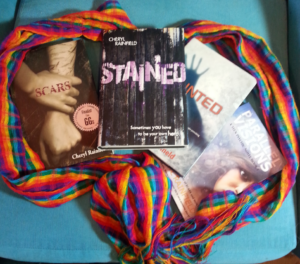 When I was a child and teen, I lived through daily/nightly rape, torture, and mind control at the hands of my parents and other abusers; my parents belonged to intergenerational, interconnected cults. I was also queer. When people hear that, they often ask me if I’m lesbian because I was raped. My answer—and that of my queer survivor characters—is a resounding no. I was raped by both men and women in the cult, and by both of my parents, grandparents, and other relatives. Each rape traumatized, disgusted, and terrified me, no matter which gender raped me. And if rape could make survivors queer, then there’d be a heck of a lot more queer people in the world since at least 1 in 3 girls and 1 in 5 boys have experienced sexual abuse by the time they reach age 18. Queer teens experience more rape than heterosexuals and have to face homophobia on top of it—sometimes in the form of rape, being beaten, being turned out of our families and homes, or other forms of hatred and fear turned on us. I think we need books that talk about these experiences in an honest and real way. LGB teens are four times as likely to attempt suicide than heterosexual teens and half of transgender teens have seriously thought of suicide and 1 in 4 attempt it.
When I was a child and teen, I lived through daily/nightly rape, torture, and mind control at the hands of my parents and other abusers; my parents belonged to intergenerational, interconnected cults. I was also queer. When people hear that, they often ask me if I’m lesbian because I was raped. My answer—and that of my queer survivor characters—is a resounding no. I was raped by both men and women in the cult, and by both of my parents, grandparents, and other relatives. Each rape traumatized, disgusted, and terrified me, no matter which gender raped me. And if rape could make survivors queer, then there’d be a heck of a lot more queer people in the world since at least 1 in 3 girls and 1 in 5 boys have experienced sexual abuse by the time they reach age 18. Queer teens experience more rape than heterosexuals and have to face homophobia on top of it—sometimes in the form of rape, being beaten, being turned out of our families and homes, or other forms of hatred and fear turned on us. I think we need books that talk about these experiences in an honest and real way. LGB teens are four times as likely to attempt suicide than heterosexual teens and half of transgender teens have seriously thought of suicide and 1 in 4 attempt it.
LGBTQIA+ teens (and adults) need to know they’re not alone and it can get better, and LGBTQIA+ survivors of rape, abuse, sexual violence, and torture need to know it even more.
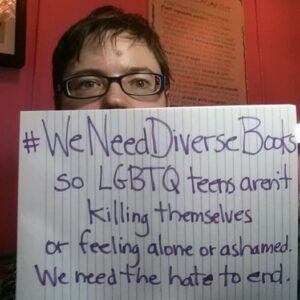 I felt so alone and in so much pain as a child and teen; I wanted to die most of the time and did actually try a few times to kill myself. I desperately wanted to know that I wasn’t alone, that I wasn’t the only one going through these horrific experiences or the only one was queer, and I tried to find that in books. I found small bits of validation, such as a character who was bullied or survived incest or a lesbian character, but I didn’t find enough—which is part of why I write the books I do. I write the books I needed to read as a teen and couldn’t find. I want others to know they’re not alone.
I felt so alone and in so much pain as a child and teen; I wanted to die most of the time and did actually try a few times to kill myself. I desperately wanted to know that I wasn’t alone, that I wasn’t the only one going through these horrific experiences or the only one was queer, and I tried to find that in books. I found small bits of validation, such as a character who was bullied or survived incest or a lesbian character, but I didn’t find enough—which is part of why I write the books I do. I write the books I needed to read as a teen and couldn’t find. I want others to know they’re not alone.
ADVERTISEMENT
ADVERTISEMENT
When we feel alone in traumatic or painful experiences—including abuse and homophobia—it makes the pain so much worse. I think when we see reflections of ourselves and our experiences, it helps lessen our pain, reassure us that we are not alone, help us feel healthier and happier, learn new ways of coping and surviving, and feel that we, too, can survive since characters with similar issues did.
Reading about characters who’ve experienced similar trauma or painful experiences can also help us decrease our shame, self-blame, and self-hatred; increase our compassion and acceptance for ourselves and others; and give us a tool to talk about the issue with others. And we all deserve to have that.
Readers have told me many times that because of my books, they were able to talk to someone for the first time about being queer, their abuse, or their self-harm; get help; stop self-harming; have more compassion for themselves or for someone who is a sexual abuse survivor, queer, or uses self-harm; feel less alone; survive the pain they’re living through; feel stronger in their own lives; and even keep from killing themselves. Books help heal.
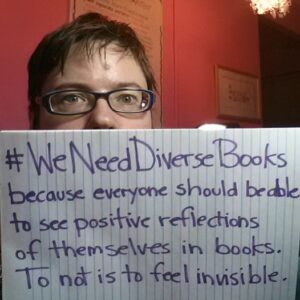 I don’t think there are enough YA novels with survivors of sexual violence written in a sensitive, realistic way, especially from someone who’s been there and knows what it’s like from the inside out; not enough YA books with queer characters; and definitely not enough books with both. And yet there is a need—not only for the queer community, but also for the world to help lessen homophobia and help increase awareness of sexual violence and its effects. An emotionally honest book about painful experiences can help readers whether they are queer or heterosexual, whether they have experienced sexual violence or some other form of abuse, or even if they haven’t experienced any of that at all but know someone who has. Books help us increase compassion and understanding by temporarily slipping into the soul of the character.
I don’t think there are enough YA novels with survivors of sexual violence written in a sensitive, realistic way, especially from someone who’s been there and knows what it’s like from the inside out; not enough YA books with queer characters; and definitely not enough books with both. And yet there is a need—not only for the queer community, but also for the world to help lessen homophobia and help increase awareness of sexual violence and its effects. An emotionally honest book about painful experiences can help readers whether they are queer or heterosexual, whether they have experienced sexual violence or some other form of abuse, or even if they haven’t experienced any of that at all but know someone who has. Books help us increase compassion and understanding by temporarily slipping into the soul of the character.
“Reading is the sole means by which we slip, involuntarily, often helplessly, into another’s skin, another’s voice, another’s soul.” –Joyce Carol Oates
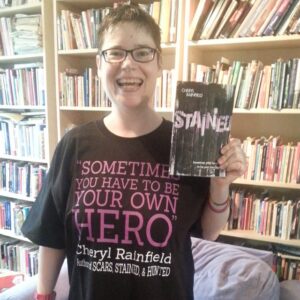 I write about many of the traumatic experiences I’ve been through—rape and incest, self-harm, being queer and experiencing homophobia from a parent in SCARS; rape, being held captive, being withheld food and water in STAINED; oppression, betrayal, and being hunted in HUNTED; homophobic-based rape and gang rape, suicidal thoughts, and depression in PARALLEL VISIONS. I write strong-girl characters, emotionally-strong boy characters, and both queer and heterosexual characters who help each other. I try to write queer characters, characters of color, and characters with mental- or physical-health issues into my books, reflecting our real world. And I also write about many of the techniques I’ve used to heal and cope—creating art, seeing a therapist, talking to friends, reading comics and collecting superhero items, creating my own superhero from myself.
I write about many of the traumatic experiences I’ve been through—rape and incest, self-harm, being queer and experiencing homophobia from a parent in SCARS; rape, being held captive, being withheld food and water in STAINED; oppression, betrayal, and being hunted in HUNTED; homophobic-based rape and gang rape, suicidal thoughts, and depression in PARALLEL VISIONS. I write strong-girl characters, emotionally-strong boy characters, and both queer and heterosexual characters who help each other. I try to write queer characters, characters of color, and characters with mental- or physical-health issues into my books, reflecting our real world. And I also write about many of the techniques I’ve used to heal and cope—creating art, seeing a therapist, talking to friends, reading comics and collecting superhero items, creating my own superhero from myself.
I always write strong-girl characters who have to save themselves. That is what I had to do—rescue myself—over and over again until I was finally safe.
I write honestly from my own trauma and healing experiences, opening up to my intense emotions, bleeding them out onto the page so the reader can feel. So that they understand—whether they’ve been through something similar or not. So that if they’ve been through it, they know they’re not alone.
And I show some of the possible side effects from rape, sexual abuse, trauma, and abuse—PTSD, dissociation, 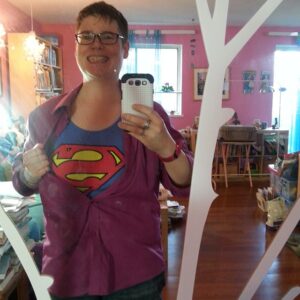 anxiety, panic attacks, depression, suicidal thoughts, self-harm, isolation—all things I’ve experienced and know well. It’s important to me to show what the effects of rape and sexual violence are really like. They leave deep emotional scars. It’s not something we walk away from and shrug off like a second skin—the way some movies, TV shows, and comics suggest. And it’s not something that I think should ever be used just for dramatic effect or to make another (usually male) character become a hero. If we don’t show the intense pain, despair, depression, and other resulting effects from rape and trauma, I think we are doing us all a great disservice by telling survivors, perpetrators, and everyone else that sexual violence leaves no trauma or side effects aside from the physical. I believe that the worst and deepest wounds aren’t physical, but are emotional and psychological. So it’s important to me to write realistic stories of sexual violence and trauma that teens can relate to, and yet are also full of hope and healing.
anxiety, panic attacks, depression, suicidal thoughts, self-harm, isolation—all things I’ve experienced and know well. It’s important to me to show what the effects of rape and sexual violence are really like. They leave deep emotional scars. It’s not something we walk away from and shrug off like a second skin—the way some movies, TV shows, and comics suggest. And it’s not something that I think should ever be used just for dramatic effect or to make another (usually male) character become a hero. If we don’t show the intense pain, despair, depression, and other resulting effects from rape and trauma, I think we are doing us all a great disservice by telling survivors, perpetrators, and everyone else that sexual violence leaves no trauma or side effects aside from the physical. I believe that the worst and deepest wounds aren’t physical, but are emotional and psychological. So it’s important to me to write realistic stories of sexual violence and trauma that teens can relate to, and yet are also full of hope and healing.
ADVERTISEMENT
ADVERTISEMENT
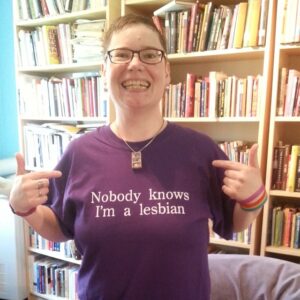 It’s also important to me to write books where the queer characters are happy with their sexuality—not just books where the character is coming out, but books where the story is about something else and the character just happens to be queer—and books where the queer characters are in relatively happy, healthy, consensual relationships, where the tension and strife is coming most from the outside, and a queer character doesn’t get penalized or killed off because they’re queer. I think books with queer characters can help normalize being queer, fight homophobia and hatred, and increase compassion.
It’s also important to me to write books where the queer characters are happy with their sexuality—not just books where the character is coming out, but books where the story is about something else and the character just happens to be queer—and books where the queer characters are in relatively happy, healthy, consensual relationships, where the tension and strife is coming most from the outside, and a queer character doesn’t get penalized or killed off because they’re queer. I think books with queer characters can help normalize being queer, fight homophobia and hatred, and increase compassion.
Queer readers need books we can enjoy and experience the way heterosexuals can most any time they pick up a book—and heterosexual readers need to be exposed to queer characters as just a reflection of the world we live in.
I think there is a great need for LGBTQIA+ YA books that have positive queer characters, that explore rape, abuse, homophobia, and trauma in realistic, sensitive, and hopeful ways, and that include both. I hope to see many more such books in the future. I will keep writing the books I need to. And I hope that you will read, write, or share the books you need to, the books that help you feel alive or the books that moved you. Read on!
Meet Cheryl Rainfield
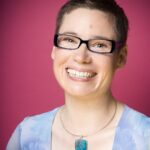 Cheryl Rainfield is the author of the award-winning SCARS, a novel about a queer teen sexual abuse survivor who uses self-harm to cope; the award-winning HUNTED, a novel about a teen telepath in a world where any paranormal power is illegal; STAINED, about a teen who is abducted and must rescue herself; and PARALLEL VISIONS, about a teen who sees visions and must save a friend. Cheryl Rainfield is a lesbian feminist, incest and ritual abuse torture survivor, and an avid reader and writer. She lives in Toronto with her little dog Petal.
Cheryl Rainfield is the author of the award-winning SCARS, a novel about a queer teen sexual abuse survivor who uses self-harm to cope; the award-winning HUNTED, a novel about a teen telepath in a world where any paranormal power is illegal; STAINED, about a teen who is abducted and must rescue herself; and PARALLEL VISIONS, about a teen who sees visions and must save a friend. Cheryl Rainfield is a lesbian feminist, incest and ritual abuse torture survivor, and an avid reader and writer. She lives in Toronto with her little dog Petal.
Cheryl Rainfield has been said to write with “great empathy and compassion” (VOYA) and to write stories that “can, perhaps, save a life.” (CM Magazine) SLJ said of her work: “[readers] will be on the edge of their seats.”
You can find Cheryl on her website CherylRainfield.com or her blog http://www.CherylRainfield.com/blog, on Twitter: http://www.Twitter.com/CherylRainfield, Instagram: http://www.Instagram.com/CherylRainfield, and FaceBook http://www.facebook.com/CherylRainfield.
Filed under: #SVYALit, #SVYALit Project
About Amanda MacGregor
Amanda MacGregor works in an elementary library, loves dogs, and can be found on Twitter @CiteSomething.
ADVERTISEMENT
ADVERTISEMENT
SLJ Blog Network
Happy Poem in Your Pocket Day!
This Q&A is Going Exactly As Planned: A Talk with Tao Nyeu About Her Latest Book
More Geronimo Stilton Graphic Novels Coming from Papercutz | News
Parsing Religion in Public Schools
ADVERTISEMENT



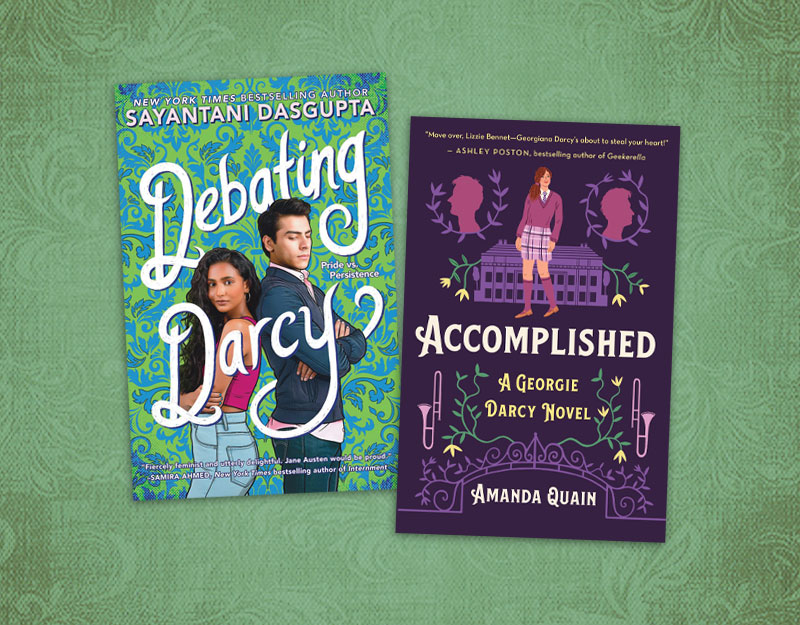
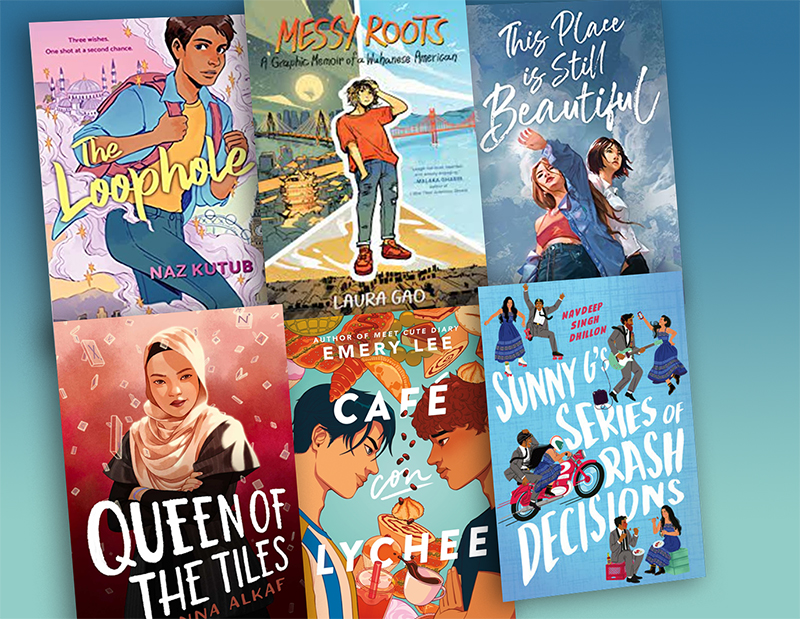
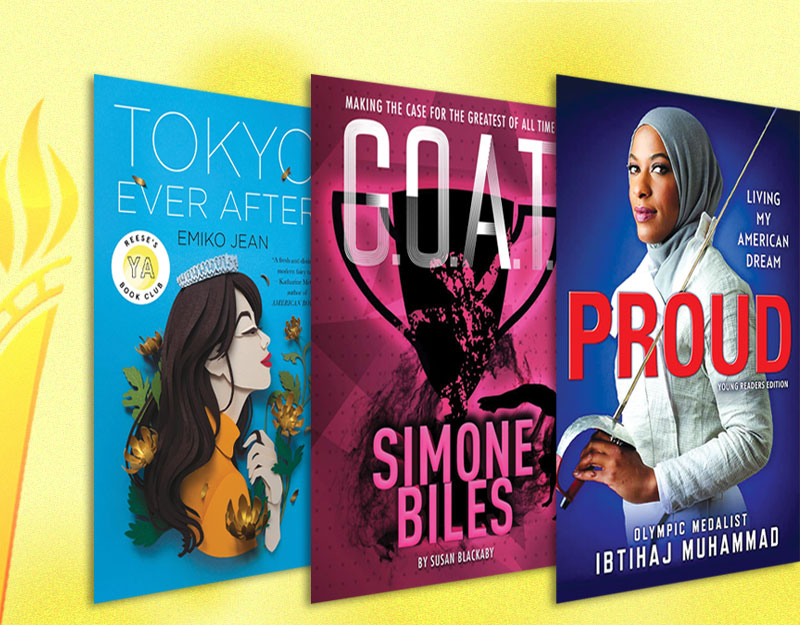
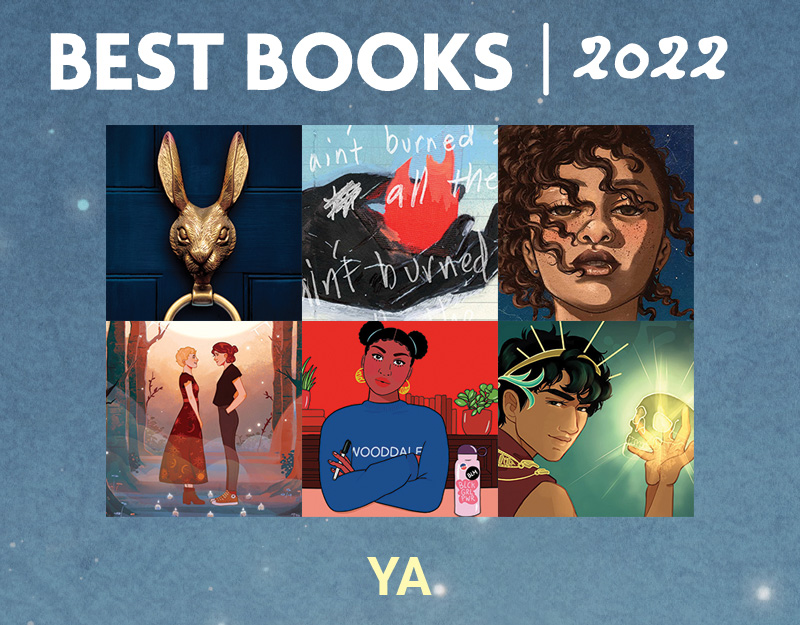
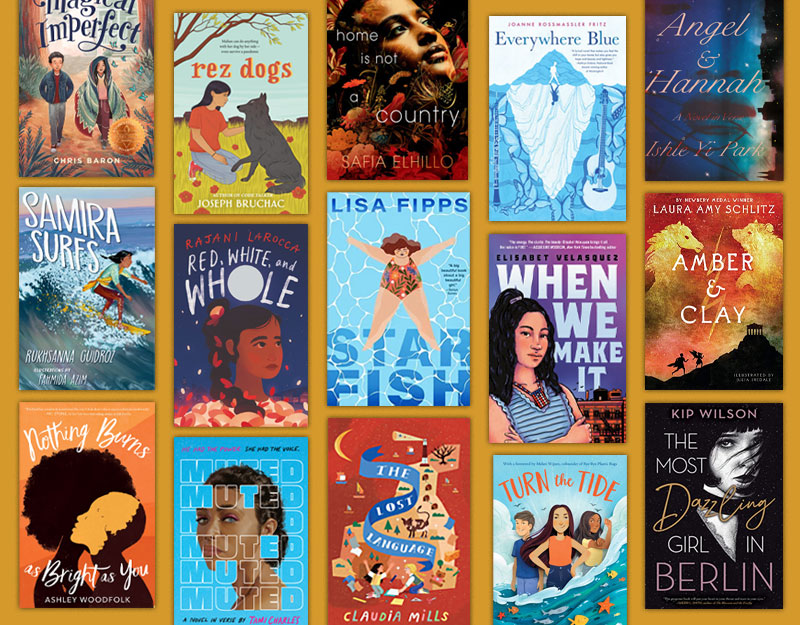
Cheryl,
Thank you for all the hard and important work you do. You truly are a hero for me, as a human being and as a writer, and I am thankful to know you as a friend. You’ve overcome so much and live out by example how important it is to find hope and healing, and perhaps resiliency, to pass on to others the same hope you’ve found for yourself as a result of your incredibly difficult past.
You’ve inspired and influenced me as a writer and sexual abuse survivor. I hope you will see this in my debut, THE PACKING HOUSE, coming out this fall from Booktrope. I would say that both SCARS and STAINED have influenced the writing of my novel, and I, too hope it gives voice to survivors of sexual assault and abuse, and to the LGBTQIA community, since my main character is questioning and unsure of his sexuality. While I am heterosexual, I hope I can continue advocating and supporting my fellow LGBT friends and writers, and help write the books we all need to represent our world. Thank you for this very important and needed article. It shines light on this topic.
Thank you, Don (hugging you). I appreciate your kind words, and I’m so glad some of my books helped inspire you! I’m glad you wrote The Packing House, and i’m very glad your main character is questioning his sexuality as well as surviving abuse; I think we need many more books to help others find their voice.
Wow, Cheryl. Before reading this post I knew nothing about you beyond your name and that you’ve written some books we have at the library, so this post hit me all at once. My first thought was HOW did you survive, how did you get away from all that, how did you find the courage and the hope to even know there was an “away” to get to; my second thought was just scrolling down and looking at the pictures of you, a beaming smile in every one, a smile that makes me think “there’s a person I’d want as a friend.” So basically, thank you for existing, thank you for being a living proof of the triumph of the human spirit, you really are a hero
Aw, thank you so much rockinlibrarian! (hugging you) Your comment felt so good to read. Books are a huge part of what helped me hope and believe that there was something better than the abuse and torture I lived with (and a few odd movies or shows I saw). I also had a few kind teachers over the years which helped. I didn’t think I would survive, though; I never imagined what I could or might be as an adult because I didn’t think I’d live to be one. My abusers frequently threatened to kill me. And I love that you’d want me as a friend; thank you! It matters so much to me to put good into the world, and to try to bring hope and compassion and healing. That’s what I try to do with my books….
Great article. I also love your point about having characters who happen to be queer, though the book is about something else. The same thing goes for characters who happen to have a disability; books need to show us the whole gamut of life, and part of that is showing that everyone goes through many different life experiences, no matter what their sexuality, abilities, colour…